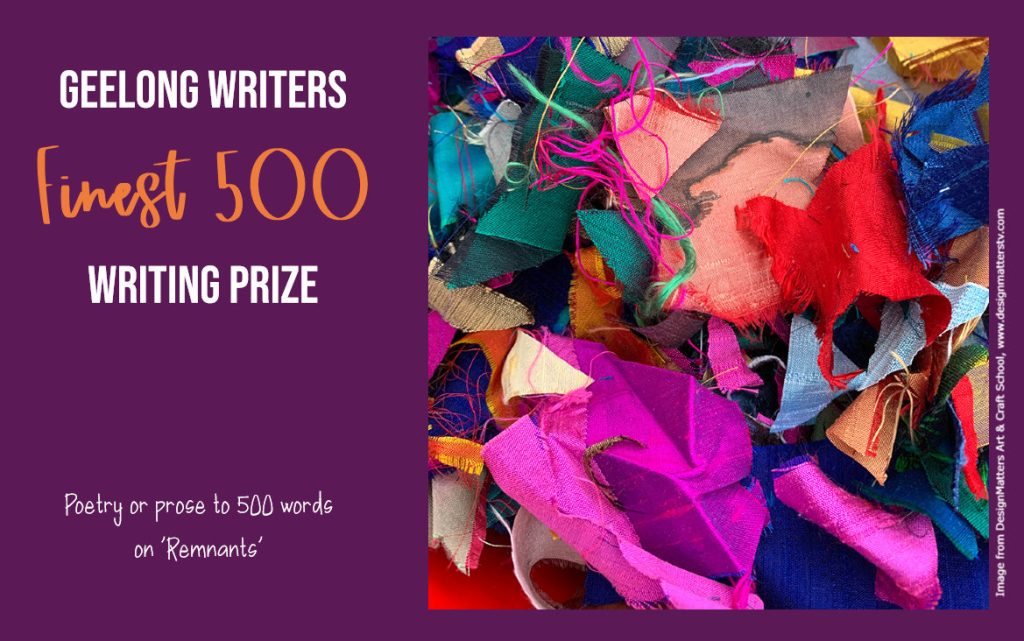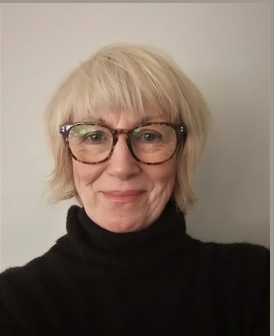
The Finest 500 is an annual competition for Geelong Writers’ members. This year, writers were invited to submit prose or poetry to 500 words in response to the theme: Remnants. Julie Maclean judged the shortlist. You can read her notes here. Finest 500 2023 Judge’s Report. Read the five prize-winning entries below.
![]()
FIRST PLACE: ‘The Part Leftover’ by Jo Curtain
In one year, I had almost forgotten my name. It is not as easy as you think, forgetting a life together. Fragments linger. Tussle. There are no rules.
One year since the last day of the marriage, I sit at a table in the Mackenzie River pub. Postcards fanned out on the pine surface, and pen poised. I am trying not to write the same thing over and over.
On the last day of the marriage, we had lunch in the pub overlooking Mackenzie Beach and later walked along it. The sand was hot. We swam in the ocean and drove home. In those early weeks after our togetherness was pulled apart. Weary. Crumpled to the floor. I appreciated the sameness of each day—the lack of expectations.
I wanted to ask the no-longer-husband what it was like not to love after thirty years. I wanted to say what it felt like standing in the shade, out of reach of love’s light.
Words floated apart. Scraps. Then, a friend said it was an opportunity, and I would not always feel like this,
‘Josie, you will feel worse. But with time, what remains will flourish.’
Tears edged my eyes. Then flowed. It was the day my no-longer-husband left for Tahiti with his new girlfriend.
The friend advised long walks in nature.
The journey to Mackenzie Beach is not trivial. There is only one road, which is dangerous even during the day in fine weather. One takes deep, steady breaths as the car climbs the cliff’s edge above the ocean until it slopes down a dirt track. A flimsy guard rail offers little protection. There is the occasional turnout. Heading home, you hug the inside curves of the road, alert to falling rocks. People have lost their lives on this road.
A moody place. Mackenzie Beach is more often covered in a dense fog. A trail of shipwrecks haunts the jagged coastline. Relics. Where words detach, and sentences churn in the swell. Until the waves give into the watery molecules, bringing them ashore to lick at our feet.
For the past few days, I have walked this stretch of sand. Cotton danced. Twisting around my limbs as I pushed through the wind, bolting across the Strait. Hunched. Vulnerable. The unwanted was shredded from my skin.
Tonight, I sit hidden from view at a corner table with a glass of wine and a bowl of chips. Postcards. Notepad. I collect fragments of stories without seeming to eavesdrop—something I used to do with my no-longer-husband. Collect. Write. Give meaning. I smile despite myself.
I have a list. Revised. And Again. It whispers.
I will stay here as long as I need to. As long as it takes to give the no-longer-husband up!
I know the marriage is dead. ———- Shaking. ………………..I let MOST things slip
————————————————————————————– from my fingertips
————————————————————————————– across the Bass Strait.
————————————————————————————– Free him. Free
————————————————————————————– myself. Then. I place one
————————————————————————————– hand, followed by the other,
over my heart.
![]()
SECOND PLACE: ‘when I heard Reckless come on’ by Alana Kelsall
I was airborne in the kitchen / radio voices / a swarm of insects sticking to my skull / hours drifting off / the beat ground me to a halt / breaking my mouth on a stone / Oh /
————— the trembling kernel inside / echo after echo inside hollow walls / showing nothing of this on my face / the weight of my smiles / the mundane job a fizzling drip in a bucket / a stop gap without stopping /
———- I thought fuck it / I was a heartbeat from the heels and hemlines of a responsible life / blindsided by the tides of you / the joy of being weightless / falling and falling / fearless of depths and shorelines / the stillness at the heart of you / rooms giving way to other rooms in your language / how much larger that world seemed / I had to leap over oceans / be the one drawing that ferry in with the singer / hoping the loved one was there / calling on those explorers of snow and deserts / not knowing whose lands they were on / the losses to come / but striding on / their lives arcing outwards /
——————– is that the core of my failures? / no even keel? / or was I the bearer of pain / leaning on love / to fall and rise like an ocean and keep falling / couldn’t see a life up ahead without you / what other side of the world was there if fear tagged along /
————————– decades later / no leaving without coming back / I hear the longing under the singer’s pain / seams opening inside me / a cry for that whirlpool of a life / tuning in for the waves rocking back to unsettle all over again /
Note: Reckless, a song by Australian Crawl, 1983
![]()
THIRD PLACE: ‘The Last Bottle’ by Kerstin Lindros
‘Our fave shar-do-nè?’ Charlie beams in the doorway of the villa and takes the bottle off Liz. ‘And perfect temperature. Merci beaucoup, chérie.’
‘You’re full of it. And don’t chérie me. Save it for Suzette or Colette or—— Let’s just deal with our unfinished business.’
Charlie steps aside and waves her through. Liz’s eyes caress the stylish luxury that, until not long ago, was her home too, while he parks the bottle on the bench.
‘How lovely of you to share our last bottle, THAT YOU TOOK.’
‘WHICH I REGRET. This stupid bottle was the only thing in the apartment that reminded me of you. We might as well crack it while we finalise our affairs.’
‘Woah! Play nice. I got a special bottle for tonight too.’ He points at the fridge. Now he peels the coat off her shoulders and goes to hang it up. Charming like in their heyday.
The delicious aromas of Indian spices wafting through the room conjure memories of the glorious years she shared with him. He’s cooked her favourite dinner. Set the table with their best crystal and dinnerware. Still tries to charm his way around everything, she thinks, hoping all will go to plan. So, one last candlelit evening then. She’ll survive.
‘You’ve really gone all out, haven’t you?’ Liz says.
‘And they say you can’t split amicably, eh?’
She reminds herself to stay calm but firm. ‘Let’s eat first and then talk settlement.’
One last taste, and now he loads up the plates. ‘Dinner is served, ch——‘
She rolls her eyes. As Charlie runs the plates to the table, Liz grabs the bottle from the bench. ‘May I?’ She pours slowly with a steady hand.
Finally she sits opposite him and lifts her glass. Swirls and sniffs. ‘Mmm.’ They clink glasses. ‘Here’s to new beginnings, Charlie.’
‘New beginnings.’ The connoisseur sips eagerly. He slurps, eyes closed, then sighs. And slurps again. Liz puts her glass down and they eat, chat and laugh. She praises his cooking prowess. She’ll miss that.
He watches her and smiles as she takes bites between stories. He often said her stories and infectious laughter had attracted him when they met.
But now he sits up, his eyes fixed on Liz. He clutches his chest and gasps for air. Fumbles a shirt button as pearls of sweat grow on his face and form rivulets down his neck. Then he sways and finally slides off his chair. Liz looks down and struts around the miserable figure on the herringbone. Then she wipes everything she’s touched and casts one last winner’s look.
To celebrate, she fetches the bottle from the fridge, pours herself a fresh goblet and settles on the lounge. She toasts herself, again and again, until her face freezes and she starts wheezing. Finally, the glass glides through her fingers and shatters on the floor.
And that is how the postman finds them when he comes to the verandah door the next day.
![]()
HIGHLY COMMENDED: ‘On the Rim of a Wheelie Bin’ (Haibun) by Jenny Macaulay
Year by year
tablecloth by embroidered tablecloth
ornament by ornament
Royal ‘something’ tea sets find their way into op shops
sell cheaply at garage sales
or are simply tossed away
until all that remains fits into this wooden box
the previous home of cutlery
tarnished beyond redemption. ………………………………………………. I open the box.
Creased, yellowed, an envelope lies
on top of primary school jotter-books filled with wax-crayon drawings –
pictures of Daddy with two ice-creams
Mummy holding a daisy. …………………………………………………….. On the envelope
in underlined capital letters written in my father’s faded discipline-hand,
my brother’s name.
My own envelope, equally labelled
lies in a suitcase of musty memories and mottled certificates of minor achievements
in the bottom of the wardrobe.
I flip the fragile flap and touch the soft lock of ginger-blond hair. …….. His first haircut.
He would have been sixty-five now.
I return to the fading photos of forgotten faces
and those that have haunted me since childhood.
Hiroshima
amongst the rubble
a dead horse
………………………………………………. the soldier arms around two Japanese girls looks like Dad
………………………………………………. my mother laughing in a paddock – holding a daisy
I balance the box
on the rim of the wheelie-bin ………………………………………………. for just a moment…
a brief whiff
of ancient
classrooms
then let the past tumble away –
the envelope ………………………………………………………………….. in my pocket.
![]()
HIGHLY COMMENDED: ‘St Francis at the Field of Mars’ by Guenter Sahr
Remnant #2
Dear Leonie, for many sleepless nights I had been haunted by the death of an inmate at Winson Green. I fall asleep for short periods throughout the following days. I write and write and re-write like a man whose grains of time are drawn with exponential vigour into the darkling bulb of the hour-glass. I ache for Berowra and the Hawkesbury, the waterhole on Coolah Creek fringed by wildflowers and its waterfall and attendant cave smoked dark with the camp-fires of millennia. I humbly beg of you Leonie, please come to take me home. Your loving brother, Frank.
Remnant #3
Rydalmere has put an end to my music. With its high ceilings and sterile stately rooms and its cloistered wards it is a ghostly monastery. The cold corridor leads me spaciously to the sunroom with its litter of musty leather settees and its sumptuous armchairs sans buttons. The warm sound of the valve radio bids me welcome to a vaulted space of floating motes made more visible in the wan sunshine slithering through the vast French windows. The geometric patterned lead-lighting creates divisions and sub-divisions and yet further sub-divisions on the thread-bare carpet’s terrain of pale pink roses and faded ivy.
Remnant #5
The piggery is a cacophony at feeding time. The drift of large whites screech and squeal with delight at the sight of me and my slop-laden buckets, and I have learnt to empty them into the trough from the shed end towards the mucked-up yard to avoid being pinned against the shed wall by these heavy beasts. In the next feeding pen are the saddlebacks, almost demure in approach to their trough. And waiting with their snouts extended through a horizontal pole fence in the north-west corner of the stone boundary of Rydalmere are the seven new Landrace pigs from Denmark.
Fragment #7
Before Rydalmere there was Warburton and its welcoming monastery of the Pallotine Fathers. Here I savoured the brisk air slowly through the soft golden sunshine and let it linger in my lungs before its slow release for the next cycle. My simple room was my scriptorium. Decanted from the rucksack, my few books and pens, journals and unlined notebooks rested on a rosewood desk two hand-widths wider than the bentwood chair under it; my one change of clothes hung lank from the bulbous ends of a bronze clothes hook against the blackwood framed door. The vegetable garden in which I lightly toiled for my keep among three seminarians was the main source of food for our evening meals. The springtime eddies coursing through the small orchard and the many hours of bird song were my main source of music; twice daily the fathers and seminarians sang their hymns.
Fragment #11
All patients at Rydalmere wear the institutional garb of canvass-coloured twill trousers and shirts imprinted with lines of light blue. If it were not for the thinner stripes we could be mistaken for the Jews of Auschwitz. Sing not of my body electric* as I convulse with each surge of current.
——-/-/——-
The parish of Field of Mars is in NSW and includes the modern Sydney suburbs of Dundas, Dundas Valley, Ermington, Rydalmere and parts of Epping, Eastwood, Melrose Park, Oatlands and Carlingford. It is Dharug country which no colonial and post-colonial palimpsests can obliterate.
Frank is Francis Charles Webb, a prolific Australian poet (1925-1973)
Winson Green is a prison in Birmingham, England (construction 1845-1849).
As well as the name of a Sydney suburb, Rydalmere was also used as abbreviation for the Rydalmere Psychiatric Hospital (1888 to 1980s).
* A reference to Walt Whitman’s poem I Sing the Body Electric (1867)
![]()
ABOUT THE JUDGE

Julie Maclean’s award-winning poetry, fiction, essays and reviews have appeared in The Best Australian Poetry, Flash (UK and US), Southerly, Overland, Griffith Review, Cordite, Kill Your Darlings, The Age and POETRY (Chicago) among others. Her short fiction and Creative Non-Fiction have won the Shakespeare Soliloquy Prize and been shortlisted for the Rachel Funari Short Story Prize, Overland Fair Australia Prize, Bass Coast Prize for Non-Fiction and nominated for the Judith Rodriguez Prize. A full manuscript shortlisted for The Crashaw Prize (Salt) was published as When I Saw Jimi, joint winner of the Geoff Stevens Memorial Prize (Indigo Dreams Publishing, UK). In October 2023 she was joint winner of the Dreich Slims Pamphlet Competition (UK). Her most recent publications, Beak and Wet Zone were published by Ginninderra Press in 2023. www.juliemacleanwriter.com

Leave a Reply